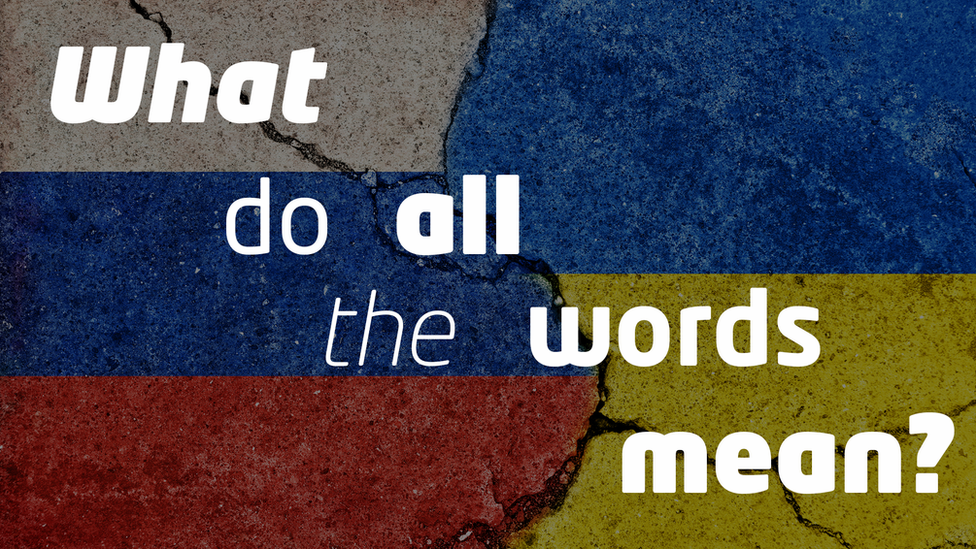Ukraine: Putin calls up 300,000 soldiers to join war
- Published
- comments
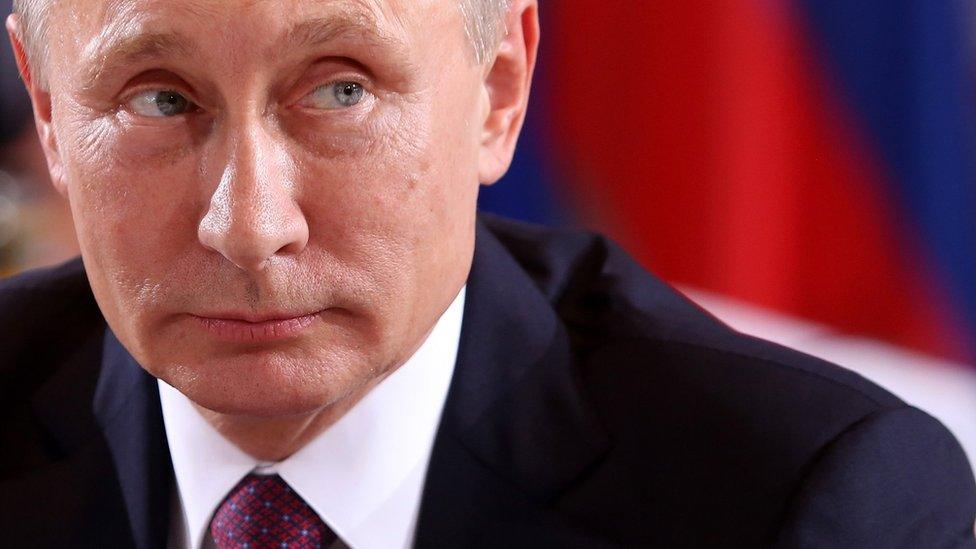
There have been important developments in Russia's war with its neighbour, Ukraine.
The president of Russia - Vladimir Putin - has been under pressure because Russia is not doing as well as he had hoped following its invasion of Ukraine.
In a televised speech, President Putin announced that he will ask Russian military reservists to join the war in Ukraine. He said that this was necessary to defend Russia and Russia's territory.
The Russian government also announced it will hold four "so-called" referendums in parts of Ukraine that are currently under Russia's control.
These referendums started on Friday and are expected to end on Tuesday 27 September.
People still living in these four areas have been asked to vote on whether to join the Russia Federation, or to stay part of Ukraine.
Countries to the west of Ukraine and Russia, including the United States, United Kingdom, Germany and France, have strongly criticised these decisions.
On Wednesday, world leaders who are members of a group called the United Nations were together in New York for a meeting where they discussed these latest developments.
WATCH: The history of Ukraine-Russia tensions (from February 2022)
Why has Russia called on military reservists?
The Russian army has not been doing as well in the war with Ukraine as President Putin originally hoped.
President Putin had thought that Russia would have a very quick victory following their invasion of Ukraine in February this year.
But the war has been going on for seven months now, with no signs of an end in sight.
And more recently, Russia has suffered some major defeats as the Ukrainian army manged to take back control of 1,000 square miles of land in the north-west of the country.
Military reservist Someone who is not currently in the army but who has experience with the army or previous army training.
Referendum A type of vote - usually on a single question or issue. A referendum will usually only have two options - to vote for or against.
Annexation To annexe usually means to add to something. In this context, annexation is when a country decides it now controls another area, without the agreement of the people involved or anyone else they might need to get permission from.
It is forbidden by international law.

This map shows the areas that the Ukrainian army took back control of
There has been pressure on President Putin to push back against Ukraine's recent success.
Until this point, Vladimir Putin has not officially called Russia's invasion of Ukraine a war - instead he has called it a "special military operation".
But in a rare televised speech to the nation, he said he will be forced to call on Russian military reservists to help fight in Ukraine.
The president has accused countries in the West of not wanting peace, suggesting that he has been forced to make this decision.
"We will use all resources we have to defend our people," he said.
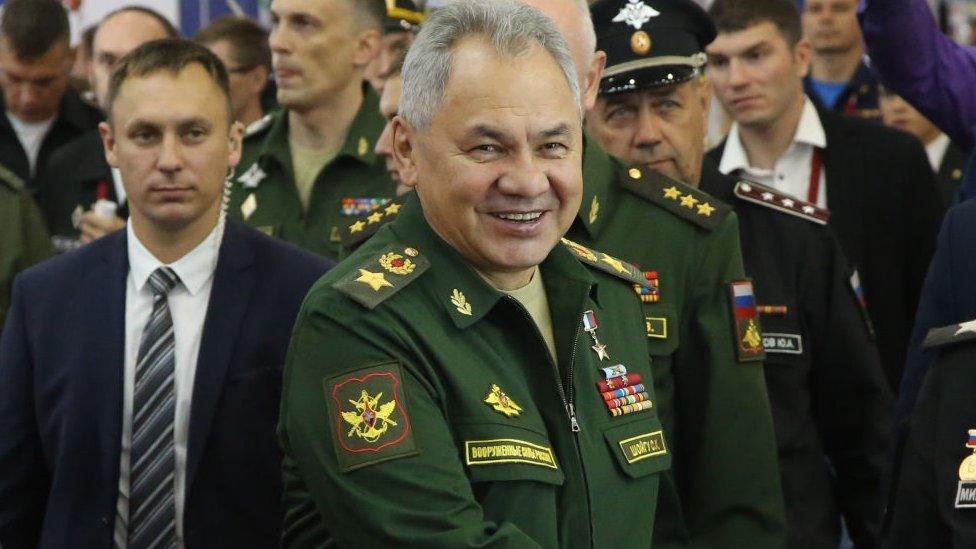
Russia's Defence Minister said that 300,000 of Russia's 25 million reservists would be called on to help fight
Russia's Defence Minister Sergei Shoigu said they would call up 300,000 Russian reservists to support the war in Ukraine.
This is just a small number of the total 25 million reservists Russia has.
Mr Shoigu said they would only be sending reservists with military experience - and not all at once.
And it may take a long time to see the impact of 300,000 soldiers joining the war in Ukraine, as there will be lots of time needed to organise this many soldiers.
Why are there four referendums being held in Ukraine?
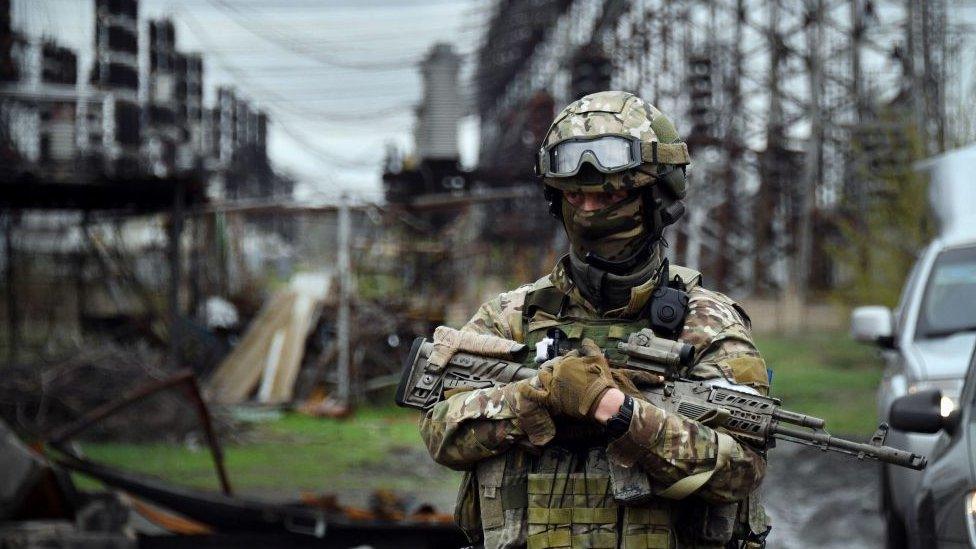
Votes are being held in areas currently occupied or partly occupied by the Russian army
In his televised speech, President Putin also spoke of his support for four "so-called" referendums that will be held in areas of Ukraine currently under partial or total Russian military control.
There have been rumours of plans for these referendums since the summer.
They are taking place from Friday 23 to Tuesday 27 September.
These "so-called" referendums will ask people who are still living in these four areas in the east of Ukraine whether they would like to join the Russian Federation, or stay part of Ukraine.
The votes will be held in the eastern regions of Luhansk and Donetsk - as well as Zaporizhzhia and Kherson in the south.
People will be able to vote in person or they can vote remotely.

But Western leaders are calling these referendums a sham - meaning that they do not think they should be considered real or legal.
Many of the people who lived in these areas before the war started have now left for safety.
Russia held a similar referendum back in 2014, when it annexed a region called Crimea from Ukraine.
The vote was held after Russian forces had invaded the region.
At the time, officials said 95.5% of voters in Crimea supported the annexation of the region to Russia.
But the referendum was criticised by the West, with both the United States and the European Union calling it illegal.
What have the reactions been?
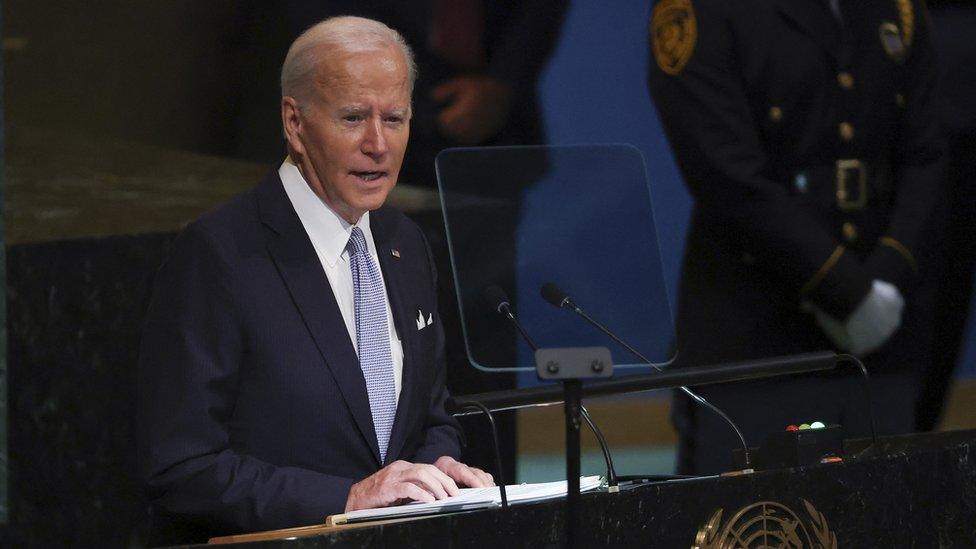
President Joe Biden spoke about the "brutal needless war chosen by one man" at an important meeting of world leaders on Wednesday
Russia's latest announcements have been strongly criticised by Western leaders and governments.
Speaking at the United Nations General Assembly in New York on Wednesday, US president Joe Biden accused Russia of trying to stop Ukraine to "exist as state, as a people".
He accused Russia of breaking the rules of the United Nations, of which it is a member.
"The world should see the outrageous acts for what they are," he told an audience of world leaders.
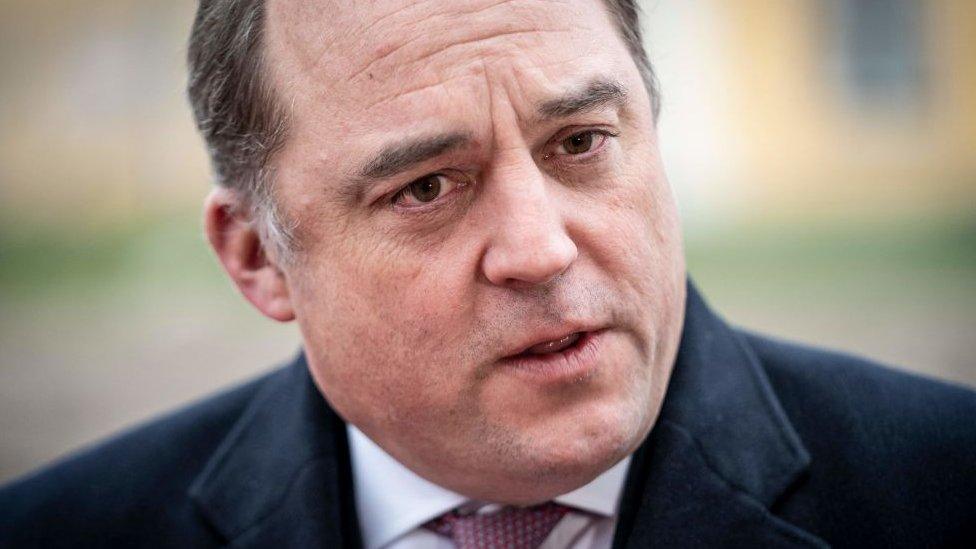
The UK's defence secretary has criticised Russia's actions
"No amount of threats and propaganda can hide the fact that Ukraine is winning this war..." said the UK's defence secretary, Ben Wallace, adding that Russia is forcing itself to become more isolated because of its actions.
The vice chancellor of Germany Robert Habeck said the calling up of military reservists was "another bad and wrong step from Russia".
And French president Emmanuel Macron was critical of the four referendums, saying: "Russia started the war, invaded this region, bombed people, made people flee and now they are saying in this very region it's going to organise a referendum."
One of the Ukrainian president's senior advisors has also criticised the referendums.
Speaking to the BBC, Mykhailo Podolyak said "they go against international law. And it looks very strange to hold a referendum in an area where fighting is taking place..."
Meanwhile Russian police are reported to have arrested hundreds of people for protesting against the government's decision to call up the 300,000 Russian reserve soldiers.
A group called the OVD-Info, who campaign for human rights in Russia, say the number of protesters arrested may be more than 1,300 people.
It was also reported flights out of Russia also sold out fast after Vladimir Putin's announcement as some people tried to leave the country.
- Published22 February 2023
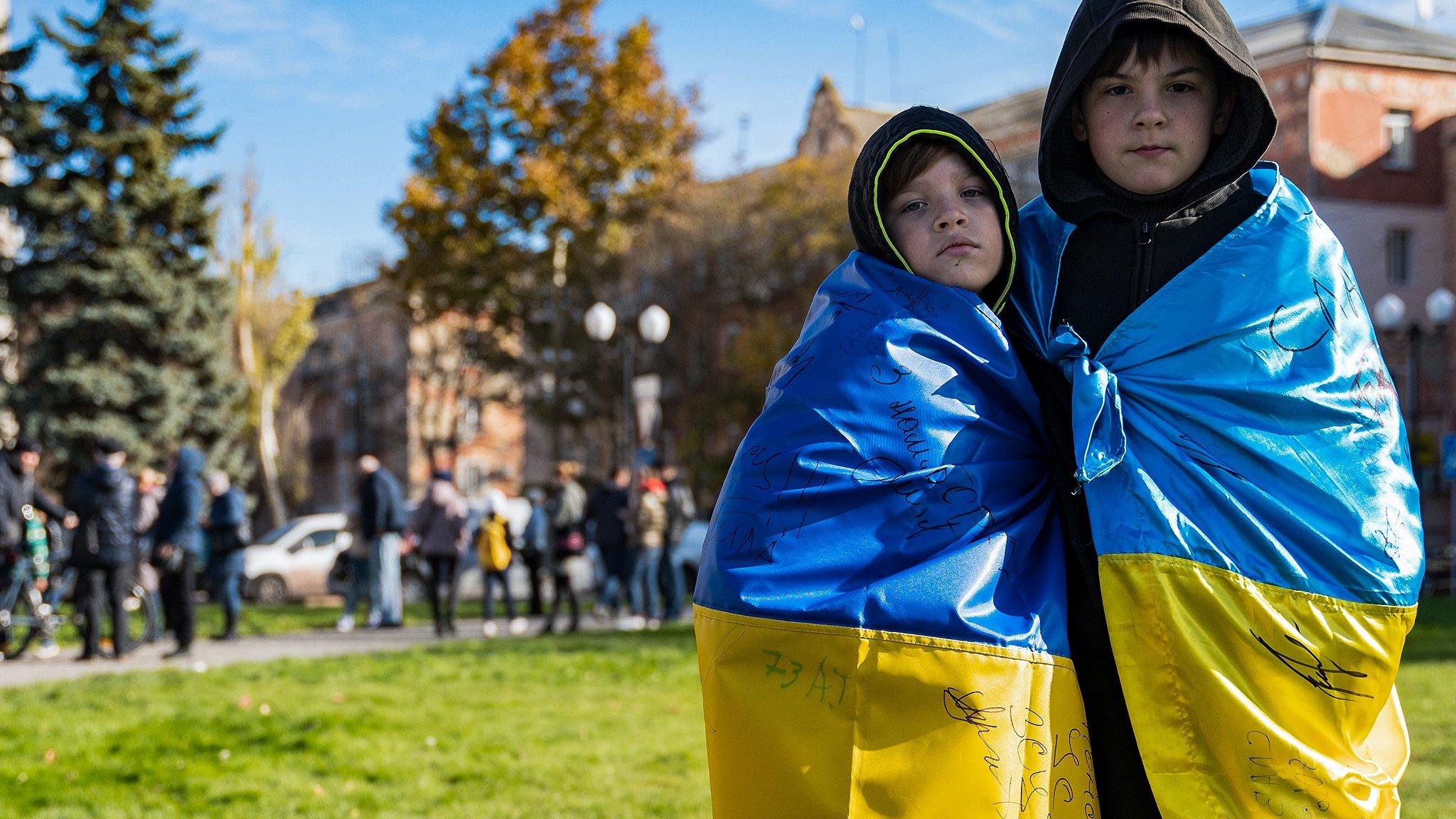
- Published8 March 2022
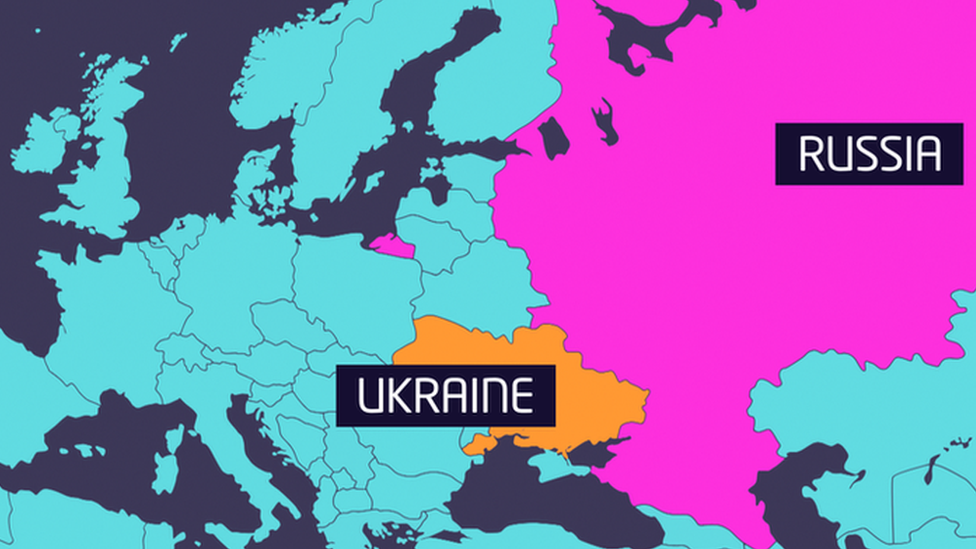
- Published1 March 2022
